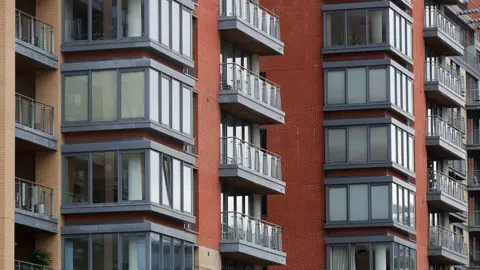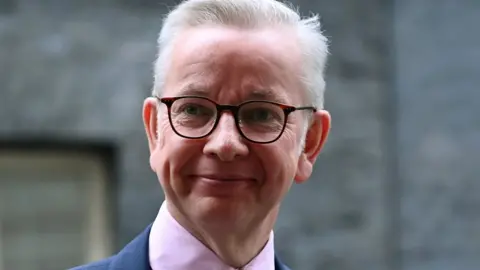Leaseholds will not be abolished by government this year
 Getty Images
Getty ImagesThe leasehold system will not be abolished in England and Wales this year, despite Housing Secretary Michael Gove previously promising to scrap it.
Mr Gove has described the system - where the owner of a property pays maintenance charges and often ground rent - as unfair and outdated.
The government says it will bring in new laws later this year to make life better for leaseholders.
But their plans will not include a date for abolishing the system.
Karolina Zoltaniecka, co-founder of the Commonhold Now campaign group, said this was "a betrayal".
She said "more sticking plaster reforms" would "do nothing to hand control to the paying leaseholders".
Mr Gove's long-held ambition is to scrap the system entirely and he has expressed this view repeatedly in media interviews and in the House of Commons.
In January, he told MPs the government would "absolutely" maintain a commitment to abolish the leasehold system and would "bring forward legislation shortly".
However, as first reported by the Guardian, legislation due in the autumn will stop short of that.
Instead, the proposed new law is expected to focus on further protections for tenants from ground rents and legal fees, and strengthening the powers they have in dealings with freeholders.
Rosemary White, who lives in a leasehold property in Bolton, said she was very disappointed by the news.
The 73-year-old said her service charge had more than doubled since she moved in around 10 years ago, which she said had been a "nightmare".
The rise was largely due to increased buildings insurance costs, but as a leaseholder she had no say over which insurance company was chosen.
As a retiree, Ms White said it had been a struggle to cover the increase and some of her neighbours had suffered financial hardship as a result.
 Rosemary White
Rosemary WhiteOnly a handful of countries still have leasehold systems but around 20% of homes in England are leasehold properties, many of them flats in cities.
Last year, the government abolished ground rents for most new residential leasehold properties in England and Wales, but only for new leases granted after June 2022.
A ground rent is often paid by owners of leasehold properties on top of their mortgage, with some facing high charges and unexpected increases.
This is because they only own the lease, which gives them the right to use the property, but not the land it is built on.
When a leasehold flat or house is first sold, a lease is granted for a fixed period of time. People may extend their lease or buy the freehold, but this can be complicated and expensive and involve legal fees.
Mr Gove's pledge to abolish leaseholds was viewed with some scepticism, even at the time, not least because an alternative system has not been fully established.
A bill including further leasehold reforms is expected in the King's Speech, which sets out the legislation the government intends to pursue in the next parliamentary session.
The scope of the bill has not yet been agreed, but it is expected to bring forward reforms that will make the leasehold system less attractive, and lay the groundwork for a viable commonhold system.
A commonhold system would mean occupants jointly own and take responsibility for their buildings without an expiring lease.
Mr Gove's ambition to move away from leasehold to commonhold is unchanged, but the existing system will not be abolished overnight, which will disappoint campaigners.
Conservative MP Bob Blackman said the "much-needed reform" had been "delayed for far too long".
 EPA
EPALabour has pledged to end the sale of new private leasehold houses and introduce a system to replace private leasehold flats with commonhold.
The party's shadow housing secretary Lisa Nandy, said: "In the space of a few months, this government has caved into backbenchers on housing targets, locked themselves in internal battles on making the basic improvements for renters and is now rowing back on leasehold commitments.
"Labour is the only party that will deliver much needed reform to give people secure, affordable and decent housing."
The government is also facing challenges over other aspects of housing policy.
In December, Mr Gove agreed to water down housing targets for local councils, in response to a rebellion from Conservative MPs.
But other Tories believe this was a mistake and that failing to build enough homes could damage the party's prospects, particularly with younger voters.
Meanwhile, long-promised legislation to reform the rental market has been delayed for "procedural" reasons, prompting criticism from campaigners and demands from Labour not to water down promised protections for tenants.
A Department for Levelling Up Housing and Communities spokesperson said: "We are determined to better protect and empower leaseholders to challenge unreasonable costs.
"We have already made significant improvements to the market - ending ground rents for most new residential leases, and announcing plans to make it easier and cheaper for leaseholders to extend their lease or buy their freehold.
"In line with our manifesto commitment, we will bring forward further leasehold reforms later in this Parliament."

Are you a leaseholder? What is your reaction? Share your views and experiences by emailing [email protected].
Please include a contact number if you are willing to speak to a BBC journalist. You can also get in touch in the following ways:
- WhatsApp: +44 7756 165803
- Tweet: @BBC_HaveYourSay
- Upload pictures or video
- Please read our terms & conditions and privacy policy
If you are reading this page and can't see the form you will need to visit the mobile version of the BBC website to submit your question or comment or you can email us at [email protected]. Please include your name, age and location with any submission.
